May 19, 2025 | 13:53 GMT +7
May 19, 2025 | 13:53 GMT +7
Hotline: 0913.378.918
May 19, 2025 | 13:53 GMT +7
Hotline: 0913.378.918
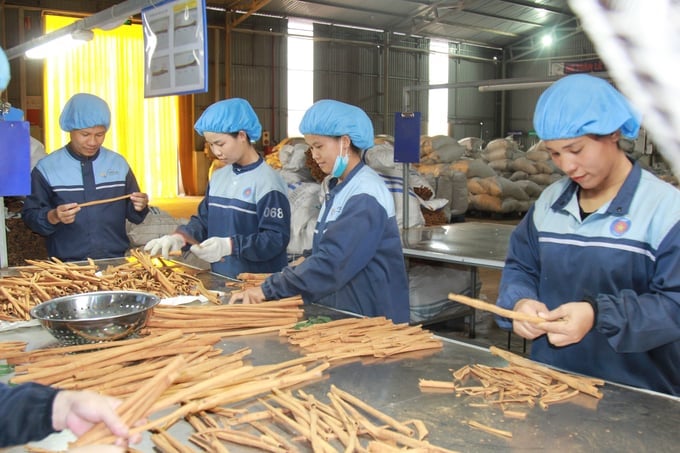
Son Ha Spice & Flavorings Co. Ltd. has collaborated with local farmers in Yen Bai and Lao Cai to develop organic cinnamon raw material areas. Photo: Thanh Tien.
Yen Bai province aims to focus on supporting the sustainable development of organic cinnamon production between 2021 and 2025 to meet domestic and international market demands. Furthermore, the province plans to increase output and export to various developed markets around the world including Europe, America, and Japan. Yen Bai also actively promotes various cinnamon development models towards intensive and organic production to acquire sustainable forest management certification. Large-scale processing and exporting businesses have taken a proactive role in establishing clean raw material areas that adhere to international standards.
Son Ha Spice & Flavorings Co. Ltd. has been purchasing cinnamon raw materials from the provinces of Yen Bai and Lao Cai for over thirty years. Notably, the company officially established a branch in Yen Bai province in 2015. Subsequently, the company expanded its scale and established a factory in Yen Hop commune, Van Yen district, Yen Bai province in 2018.
Son Ha Company specializes in processing and exporting cinnamon, star anise, and pepper, with its main export market (accounting for 95%) being the United States and European countries.
According to Mr. Le Van Long, Project Manager at Son Ha Company, the company previously exported cinnamon to relatively accessible markets such as India, Bangladesh, and China, where consumers value low prices over quality. After 2015, the company embraced a new business philosophy, with a focus on the establishment of a sustainable production and trading model; collaboration with farmers to establish organic cinnamon production areas; investment in high-tech deep processing factories for cinnamon products. This transition process has been conducted in strict compliance with international standards.
The transition to a standardized, sustainable production and trading model will present significant challenges; however, Son Ha Company is committed that businesses and the local community must follow this development orientation in order to succeed in sustainable development.
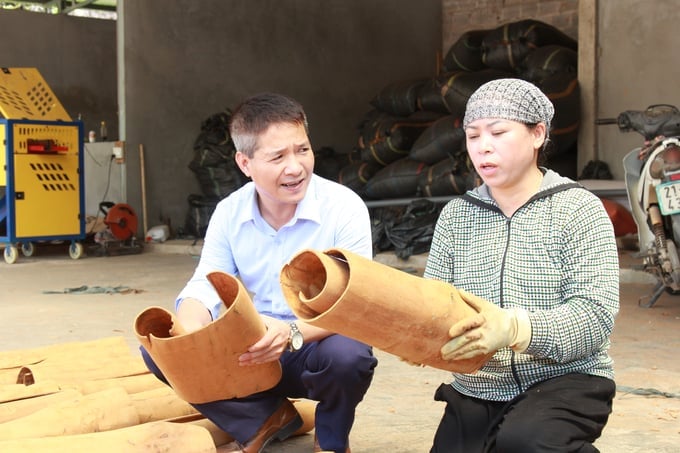
Son Ha high quality cinnamon products are exported to various demanding markets around the world such as the United States and European countries. Photo: Thanh Tien.
"Once we are able to create products that strictly adhere to international standards and regulations, we will be able to conquer demanding markets with vast potential such as the United States, Japan, Europe and so on.
During the early stages of the transition, the company invested extensively in gaining the confidence of local farmers, as well as training and assisting them in adjusting well-established traditional farming practices. Following these changes, the company continued to accompany the farmers for several years to manage the quality of their products in accordance with established requirements," shared Mr. Le Van Long.
According to Mr. Le Van Long, over 80% of the population in Bac Ha, a mountainous district in Lao Cai province, are members of ethnic minorities. Cinnamon trees have provided the local community, particularly the ethnic minorities, with a substantial source of income and various employment opportunities. Notably, farmers in key cinnamon production areas rely primarily on cinnamon as their main source of income, constituting between 75 and 80 percent of their total earnings.
The farmers of Bac Ha district have a long-standing tradition with organic production; however, their production models are spontaneous and limited in terms of cultivating and harvesting techniques. Namely, local Investment in cinnamon production is inadequate; and the local techniques for cultivating and harvesting cinnamon are rudimentary. Moreover, local farmers are unaware of potential markets, especially for exports, as well as requisite standards. Due to the inconsistent quality of harvested cinnamon and a lack of connection with traders, locally produced cinnamon is frequently sold at low and unstable prices.
In 2019, Son Ha Company collaborated with the GREAT Project, the SNV Netherlands Development Organization, and the Lao Cai province's Agricultural Extension Center to develop a value chain and market system for cinnamon in Nam Det commune, Bac Ha district. Accordingly, the collaborating parties focused on producing and trading high-value organic cinnamon products by enhancing the local techniques for harvesting, producing and processing cinnamon, and establishing a strong connection between local farmers and high-end consumer markets.
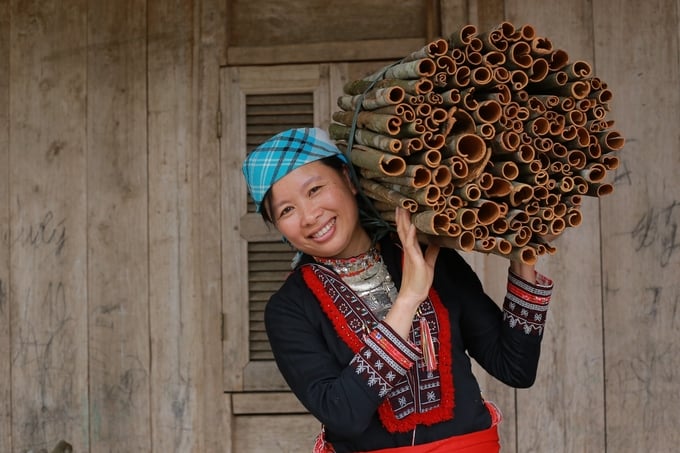
With higher income levels and supported product consumption, local farmers have developed a strong connection with organic cinnamon production businesses. Photo: Thanh Tien.
Son Ha Company has conducted internal surveys, assessments, selection, and training for over 300 households in the commune on the principles of organic production, which cover cultivation, caring, harvesting, and preservation techniques. After recognizing the health and environmental risks associated with the use of pesticides and herbicides, farmers have gradually eliminated the use of chemicals in the farming process to focus on sustainable development.
To date, over 300 households with nearly 1,300 hectares of cinnamon production area in Nam Det commune have been granted organic certifications in compliance with USDA and EU standards. Consequently, organic certifications have allowed local farmers to charge a consistent price for their cinnamon products. Furthermore, Son Ha Company has established offtake contracts to purchase high-quality cinnamon from local farmers. The company plans to focus on developing its purchasing network and establishing various localized collection points in each hamlet. Notably, these collection points must undergo training on managing procurement, meeting the company's established standards for quality, and evaluating product quality based on different indicators.
In addition to purchasing cinnamon and maintaining a stable outlet for local farmers, Son Ha Company rewards households that practice and adhere to organic production principles. Accordingly, the Company has distributed over 550 million Vietnamese dong in bonuses to members of the organic cinnamon supply chain in Nam Det commune, Bac Ha district. Namely, local farmers received a bonus of over 400 million Vietnamese dong, and local collection points received a bonus of over 150 million Vietnamese dong.
Son Ha Company has collaborated with the local governments of Yen Bai province since 2015 to establish task forces, raw material areas, and preliminary processing areas for cinnamon products. Additionally, the company provided training on sustainable cinnamon production practices and producing high-value-added cinnamon products such as cinnamon sticks. Son Ha Company also established a localized network of distributors and collection points in each hamlet.
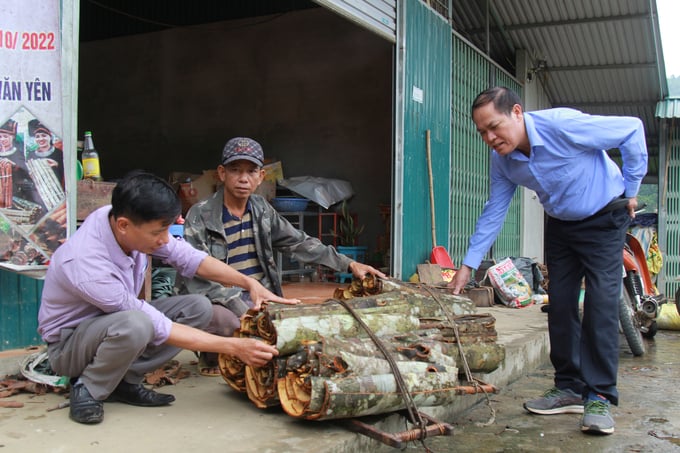
Son Ha Company ensures that its products meet standards by closely monitoring each stage of the production process. Photo: Thanh Tien.
In addition to its current 2,500-hectare organic cinnamon production area, Son Ha company undergoes certification procedures for cinnamon production areas that meet the UEBT/RA standards for ethical biodiversity trade, business and sustainable agriculture.
Mr. Truong Minh Hoan, a farmer in An Thinh commune, Van Yen district, has been engaged in cinnamon production for over 20 years. Mr. Hoan's family and neighboring households have received training on organic cinnamon production techniques from Son Ha Company and local agricultural extension officers since 2015. As a result, Mr. Hoan is currently managing over five hectares of certified organic cinnamon production area.
According to him, local farmers saw no significant value in cinnamon development projects in the past; and the market for cinnamon products was unstable. However, they can now confidently engage in production activities with established brand recognition for cinnamon, and the company providing direct market access for local farmers.
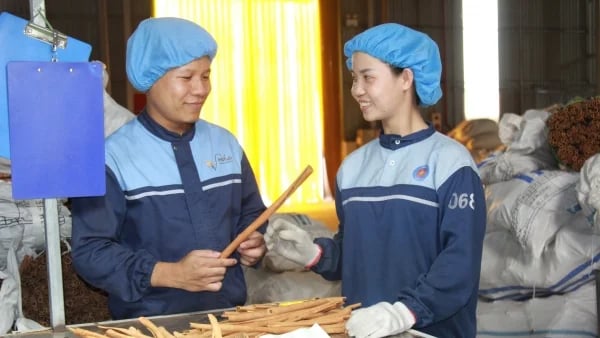
Son Ha processed cinnamon products are capable of meeting the demanding requirements of international markets. Photo: Thanh Tien.
Son Ha Company assigns internal inspectors to each raw material area to oversee and evaluate farmers' compliance with organic production principles. Additionally, the company's technical staff monitor distribution activities within raw material areas to maintain origin traceability, and prevent contamination during transportation, processing, and storage. The company also provides free bags and ties to distributors and farmers with organic products to prevent cross-contamination. Notably, Son Ha Company implements an annual policy to reward outstanding organic cinnamon farmers and distributors.
Furthermore, the company supports livelihood development and social welfare through endemic plant cultivation and vegetation maintenance models, livestock production models, waste collection ponds, clean water supply, equipment in schools and health stations, and sustainable community development.
According to Mr. Le Van Long, Project Manager at Son Ha Spice & Flavorings Co. Ltd., the company has recently received support from Yen Bai province in the form of a project to develop a production, consumption and processing linkage model for high-quality organic cinnamon products. The company has also assisted local farmers in obtaining organic certification for export to various international markets including Europe, the United States, Japan, and South Korea. To date, Son Ha Company has directly signed contracts with numerous households in Lao Cai and Yen Bai, with over 4,000 hectares of organic and internationally qualified cinnamon production areas.
Translated by Nguyen Hai Long

(VAN) 14 out of 35 domesticated elephants in Dak Lak province have had their living conditions improved, with 11 of them currently participating in the non-riding elephant tourism model.

(VAN) Muong Nhe Nature Reserve hopes that being upgraded to a national park will lay the foundation for forest protection efforts to be carried out in a systematic, modern, and sustainable manner.
/2025/05/16/3923-2-171845_52.jpg)
(VAN) Lower costs, higher yields, and improved soil quality are outstanding benefits that soybeans bring when integrated into the crop rotation system.

(VAN) The 'For a Green National Environment' programme aims to promote a green lifestyle, support businesses in implementing ESG practices, and turn Net Zero commitments into concrete actions.

(VAN) Cold-barn systems efficiently manage environmental and temperature conditions, which aids in the prevention of respiratory diseases in pigs and protects them from the vectors that transmit African swine fevers.

(VAN) To tackle challenges, the project 'Addressing key technical bottlenecks in the grouper supply chain in Vietnam' has been underway since 2024.

(VAN) The project 'Disease-Resilient and Sustainable Cassava Production Systems in the Mekong Region', funded by the Australian Center for International Agricultural Research (ACIAR), is being implemented from 2024 to 2028.